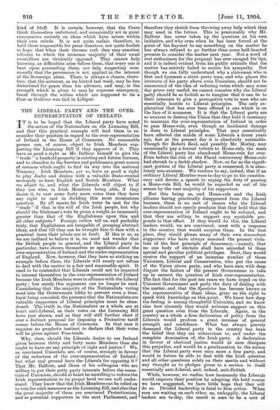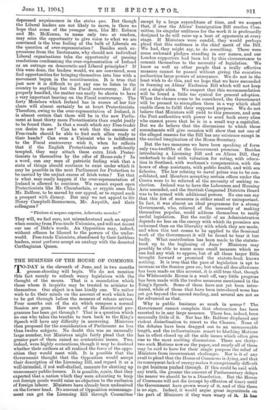THE LIBERAL PARTY AND THE OVER- REPRESENTATION OF IRELAND.
IT is to be hoped that the Liberal party have noted the action of the Nationalists on the Licensing Bill, and that this practical example will lead them to re- consider their position in regard to the over-representation of Ireland in the House of Commons. No reasonable person can, of course, object to Irish Members sup- porting the Licensing Bill if they approve of it. They have as good a right as Mr. Balfour himself to give the "trade "a freehold property in existing and future licenses, and to abandon to the brewers and publicans a great source of revenue which ought to find its way into the national Treasury. Irish Members, per se, have as good a right to play ducks and drakes with a valuable State-created monopoly as have English and Scotch Members. What we object to, and what the Liberals will object to if they are wise, is Irish Members being able, if they desire it, to cast some forty more votes than they have any right to cast in deciding this most momentous question. By all means let Irish votes be cast for the " trade " if that is the will of the Irish people, but why should the Irishman's vote be given a weight so immensely greater than that of the Englishman upon this and all other subjects ? Foreign critics tell us, and probably truly, that Englishmen are incapable of grasping abstract ideas, and that till they can be brought face to face with a practical issue thdr minds are at fault. If this is so, as we are inclined to believe it is, we need not wonder that the British people in genera], and the Liberal party in particular, have shown themselves so apathetic about the over-representation of Ireland and the under-representation of England. Now, however, that they have so striking an example before them, the Liberals will surely not refuse to deal with the matter in a fair and reasonable spirit. It used to be contended that Liberals could not be expected to interest themselves in the over-representation of Ireland because the Irish Members were in alliance with the Liberal party ; but surely this argument can no longer be used. Considering that the majority of the Nationalists voting went into the Government lobby to prevent even a time- limit being conceded, the pretence that the Nationalists are valuable supporters of Liberal principles must be aban- doned. The truth is, the Nationalists as a whole are at heart anti-Liberal, as their votes on the Licensing Bill have just shown, and as they will still further show if ever a distinct proposal for imposing a Protective tariff comes before the House of Commons. In that case it requires no prophetic instinct to declare that their votes will be given against Free-trade.
Why, then, should the Liberals desire to see Ireland given between thirty and forty more Members than she ought to have on any principle of right and justice ? We, as convinced Unionists, are, of course, strongly in favour of the reduction of the over-representation of Ireland ; but what real ground have the Liberals for opposing it ? That Mr. Balfour, and those of his colleagues who are willing to put their petty party interests before the essen- tials of Unionism, should at heart be unwilling to reduce the Irish representation to its proper level we can well under- stand. They know that the Irish Members can be relied on to vote for such measures as the Licensing Bill, and also that the great majority of them are convinced Protectionists, and so potential supporters in the next Parliament, and therefore they shrink from throwing away help which they may need in the future. This is presumably why Mr. Balfour has never taken Up the question on his own initiative, and why even when he has been forced at the point of the bayonet to say something on the matter he has always refused to go further than some half-hearted promise to consider the matter next year. Not a word of real enthusiasm for the proposal has ever escaped his lips, and it is indeed evident from his public attitude that the matter has entirely failed to secure his sympathy. But though we can fully understand why a statesman who is first and foremost a strict party man, and who places the interests of his party above even Unionism, should not be enamoured of the idea of reducing votes which may some day prove very useful, we cannot conceive why the Liberal party should be so foolish as to imagine that it can be to their interests to give a prerogative vote to men who are essentially hostile to Liberal principles. The only ex- planation that has ever been offered is one which is on the face of it nonsense. It is that the Liberal party are so anxious to destroy the Union that they hold it necessary to maintain the over-representation of Ireland in order to pass Home-rule, even though an incidental damage is done to Liberal principles. That may conceivably have affected the minds of some Liberals a dozen years ago, but at the present day it is absolutely untenable. Though Sir Robert Reid, and possibly Mr. Morley, may occasionally pay a formal tribute to Home-rule, the mass of the Liberal party has abandoned Home-rule for ever. Even before the rise of the Fiscal controversy Home-rule had shrunk to a feeble shadow. Now, as far as the signifi- cant portion of the Liberal party is concerned, it is abso- lutely non-existent. We venture to say, indeed, that if an ordinary Liberal Member were to-day to go to his constitu- ency and devote a speech to urging the duty of passing a, Home-rule Bill, he would be regarded as out of his senses by the vast majority of his supporters.
But this being so, and Home-rule and the Irish alliance having practically disappeared. from the Liberal banners, there is no sort of reason why the Liberal leaders should not openly proclaim that they hold that the over-representation of Ireland ought to be reduced, and that they are willing to support any equitable pro- posals to that effect. If they would do this, the Liberal leaders would, we are convinced, meet with• a response in the country that would surprise them. In the first place, they would please many of their own staunchest supporters who have always resented the present viola- tion of the first principle of democracy,—namely, that no one body of electors shall have accorded to them special and peculiar political privileges. Next, they would receive the support of an immense number of those Unionists, Liberal and Conservative, who put the cause • of the Union above party, and who have seen with deep disgust the failure of the• present Government to take up in earnest the question of Irish over-representation. The fact that for the past ten years we have urged on the Unionist Government and party the duty of dealing with the matter, and that the Spectator has become known as the representative of these ideas, gives us the right to speak with knowledge on this point. We know how deep the feeling is among thoughtful Unionists, and we know also how sincerely they would welcome support on this great question even from the Liberals. Again, in the country as a whole a firm declaration of policy from the Liberals would produce a great increase of general strength and confidence. What has always gravely damaged the Liberal party in the country has been the belief that they are subservient to, and under the complete domination of, the Irish party. A declaration in favour of electoral justice would at once dissipate this prejudice, and would be a proclamation to the nation that the Liberal party were once more a free party, and would in future be able to deal with the Irish question and all other questions solely on their merits and without any thought as to pledges given to a section in itself essentially anti-Liberal, and, indeed, anti-British.
While, however, we realise how immensely the Liberals would improve their position by adopting the bold course we have suggested, we have little hope that they will do so. Divided leadership is fatal to firm action. When men are waiting on each other, as, unhappily, the Liberal leaders are to-day, the result is sure to be a sort of depressed acquiescence in the status quo. But though the Liberal leaders are not likely to move, is there no hope that some of the younger men, like Mr. Robson and Mr. McKenna, to name only two at random, may seize the opportunity to give voice to what we are convinced is the true feeling of the bulk of Liberals on the question of over-representation ? Besides such ex- pressions from the lieutenants, why should not individual Liberal organisations take the opportunity of passing resolutions condemning the over-representation of Ireland as an outrage on democratic and Liberal principles ? If this were done, the leaders would, we are convinced, soon find opportunities for bringing themselves into line with a movement begun in the constituencies. It is true that just now it is difficult to get any one to listen in the country to anything but the Fiscal controversy. But if properly handled, the matter can easily be shown to have a very important bearing on the Fiscal controversy. The forty Members which Ireland has in excess of her fair share will almost certainly be at heart Protectionists. Therefore, owing to the over-representation of Ireland, it is almost certain that there will be in the new Parlia- ment at least thirty more Protectionists than ought justly to be found there. Is that a result which any Free-trader can desire to see ? Can he wish that the enemies of Free-trade should be able to find such allies ready to their hands ? Can even a Unionist who is indifferent to the Fiscal controversy wish it, when he reflects that if the English Protectionists are sufficiently tempted, they may attach these extra Irish Protec- tionists to themselves by the offer of Home-rule ? In a word, can any man of patriotic feeling wish that a state of things should continue to exist under which it may be possible in the next Parliament for Protection to be carried by the unjust excess of Irish votes ? Yet that is what may easily happen if the over-representation of Ireland is allowed to continue. We cannot expect open Protectionists like Mr. Chamberlain, or cryptic ones like Mr. Balfour, to be moved by our appeal, or to regard such a prospect with dismay. But may we not appeal to Sir Henry Campbell-Bannerman, Mr. Asquith, and their colleagues ?
" Fleetere si nequeo superos, Acheronta movebo."
They will, we feel sure, not misunderstand such an appeal when coming from Free-trade Unionists, and will not resent our use of Dido's words. An Opposition may, indeed, without offence be likened to the powers of the under- world. Free-trade Unionists, abandoned by their faithless leaders, must perforce accept an analogy with the deserted Carthaginian Queen.











































 Previous page
Previous page